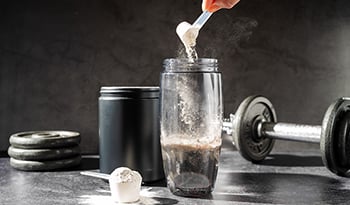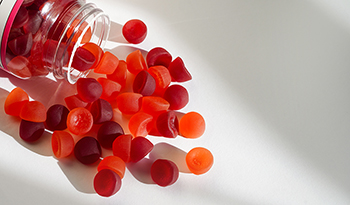The Supplement “Starter Kit” for Your New Year’s Fitness Resolutions

Every New Year, committing to a fitness plan is a popular resolution. And as you dedicate yourself to a rigorous workout program, you must nourish your body with wholesome foods. Now while it is possible to get all the nutrients you need for optimal results strictly from food sources, oftentimes it’s simply not convenient to do so. In this case, supplements may become an important part of your nutrition strategy.
Here are a few supplements to include in your New Year’s fitness supplement “starter kit.”
Protein
Protein provides the building blocks for muscle in your body. So it is required for the repair and growth of muscle after exercise. Muscle fibers sustain microscopic damage whenever you exercise, especially during resistance (or weight-training) exercise. This damage is actually the normal stimulus for muscle repair and growth in your body. But if you don’t have enough protein, recovery cannot occur after you’ve been exercising a lot.
So how much protein do you need? The Recommended Dietary Allowance for protein in healthy adults is 0.8 grams per kilogram of body weight. For an athlete or a pregnant woman, or in the case of certain medical conditions, protein-intake needs may be as high as 1.2 to 1.7 grams per kilogram of body weight.
Omega-3
When it comes to fitness training, taking an omega-3 fatty acid supplement can be especially useful because of its anti-inflammatory effect. Research has shown that omega-3s can improve recovery and reduce delayed-onset muscle soreness. Additionally, Omega-3 fatty acids also may contribute to the maintenance of a healthy weight.
Omega-3 is one of two essential fatty acids, the other being omega-6. They’re called essential because they are necessary for important functions in the body. They form crucial components of cell membranes and are precursors to many of the body’s regulatory substances. However, the human body does not make omega-3 and omega-6, so these fatty acids must come from food or a supplement.
Although the body needs omega-6, getting too much can become a problem. When omega-6 intake rises above a certain level compared to omega-3, it cancels out the benefits of omega-3. The optimal ratio of omega-6 to omega-3 intake is 2:1 (or up to 3:1). However, the standard American diet is typically characterized by ratios of up to 20:1 (and even up to 50:1!)—so you can see why a supplement might be helpful.
Magnesium
While magnesium plays many roles in the body, its significance to your fitness training cannot be ignored. Research has found that magnesium deficiencies decrease metabolic efficiency. In other words, if magnesium is too low, you’ll need more oxygen and an increased heart rate to perform a given workout.
Magnesium’s other important roles in your body include regulating the neuronal function of the brain. So it can be helpful in warding off anxiety and depression. It can also safeguard your cardiovascular health because it can act to dilate blood vessels, dissolve blood clots, and even prevent heart attacks (occurring from severe spasms of the heart). Because of its effects on calcium in the body, magnesium is also a key nutrient for bone health.
A National Institutes of Health (NIH) study showed that 68% of Americans are deficient in this vital mineral. According to the NIH, the recommended daily intake for women is 320 mg; for men, it is 420 mg. A commonly recommended form of magnesium for supplementation is magnesium glycinate because it is highly absorbable while being less likely to cause laxative effects compared to some other magnesium supplements. If you do experience loose stools, you should cut back on your dose.
DISCLAIMER:This Wellness Hub does not intend to provide diagnosis...
















































































 Table of Contents
Table of Contents
















